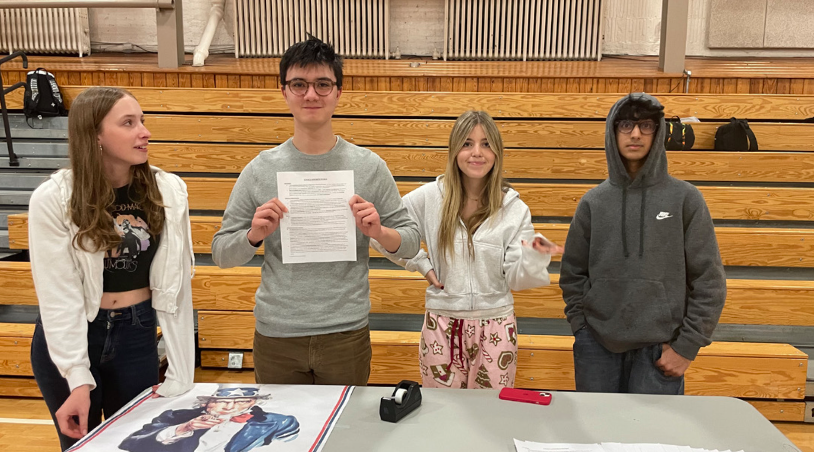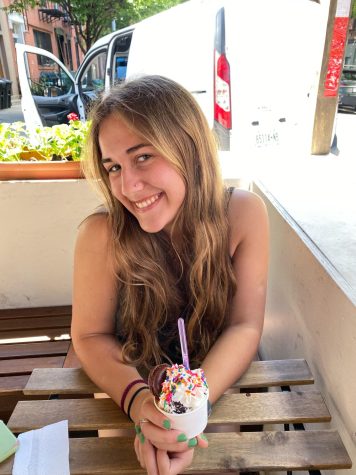Civics Day Education Substitutes Classes Between Semesters
February 17, 2023
Poly Connected returned as a new iteration of Community and Diversity Day between the two semesters on January 25. The day was split into two portions: Poly Connected and Civics Day.
The morning of Poly Connected began with an assembly and a speech by Erika Freeman, Interim Director of Diversity, Equity, Inclusion, and Belonging (DEIB), to set the tone for the day. Freeman began by asking students to be attentive and engaged throughout the day’s programming. Then she played the song “Stand Up for Something” by Andra Day on the chapel’s speakers. Next, she introduced Poly alum and spoken word poet James Seaton ’15.
Seaton ran a workshop about empathy using his spoken word. He read his poem “the tree,” which said “the problem with America is that a tree falls in a forest everyday … the whole forest collapses.” The emphasis throughout his presentation was on empathy, which is about stepping into someone else’s shoes, to influence action. During Seaton’s time at Poly, he said felt that it was a “mixed bag” in terms of how empathetic people were. Later, he developed his skills doing public relations in empathizing with all different kinds of clients. Seaton believes empathy increases understanding, builds community, and promotes leadership.
Following the assembly, students participated in three different small group discussions facilitated by a student leader or faculty member. One was about defining each term in DEIB — “diversity, equity, inclusion and belonging.” Each group created working definitions for each term and then connected it to a piece of media, like a video of Maya Angelou’s recitation of “Still I Rise.” Students were asked to think about and discuss the department name to kick start understanding of why we have it. Another group worked on defining intersectionality, intellectually and personally. Every student wrote down their identities on an identity wheel and was challenged to think about how each identity affects their understanding of themselves or others perceptions of them. The third discussion was about examining empathy at Poly and practicing understanding others’ perspectives. Each participant wrote a response to prompts about empathy at Poly and the leader anonymously read them out loud as participants discussed the thought.
“This was the first time in many years where I felt we were capturing the meaning of the early days of really asking tough questions and challenging issues in ways that we had glossed over for many years,” Bernieri said. He facilitated a room about defining DEIB, which he believes is necessary, as students have heard the acronym, but often have not thought about it.
Freeman said she believes that the students that were present were engaged with Seaton. However, there was a clear lack of attendance.“Students have to make the choice [to engage in the day],” said Bernieri. Though, as Freeman pointed out, “More people showed up this year than last year because of athletics,” since Head of Upper School Sarah Bates sent an email the day before warning students that they could not go to practice if they did not sign in before 8:45 a.m..
The afternoon shifted away from Poly Connected towards Civics Day, dedicated to engaging in the world around us and getting involved. This event started as three different panel discussions from juniors and seniors in a Poly Advanced History course. The panels were called “Improving Democracy,” “Is the Media Really the Problem?” and “Is Change Possible?” Students and faculty engaged each panel with questions, as the Upper School contemplated the state of American democracy and the difficult question: Is there hope?
To end the day, upperclassmen participated in a discussion focused on bridging polarization. Each group was assigned a topic and challenged to write arguments opposing their own beliefs. This was done through a website designed by Senior Rory Schoenberger, who created Civics Day with the Civics Learning Team and History Department Chair Maggie Moslander’s help. Schoenberger said, “Civics Day was born as a reaction to the animosity that existed between different political groups at Poly Prep around the 2016 and 2020 elections.” Groups discussed abortion, immigration, progressive taxation, the electoral college, free college, capital punishment, affirmative action, government subsidized healthcare, or defunding the police. This exercise was not about changing others’ opinions, but trying to have a productive discussion.
Poly clubs and outside organizations hosted tables at the civics fair. Students did ten-minute rotations in which each table discussed what their group does and how they are connected to civics and/or politics. Schoenberger commented, “We hope that students take away an understanding of how they can get involved with organizations and make change in the political sphere along with how they can find common ground within political conversations.”


























